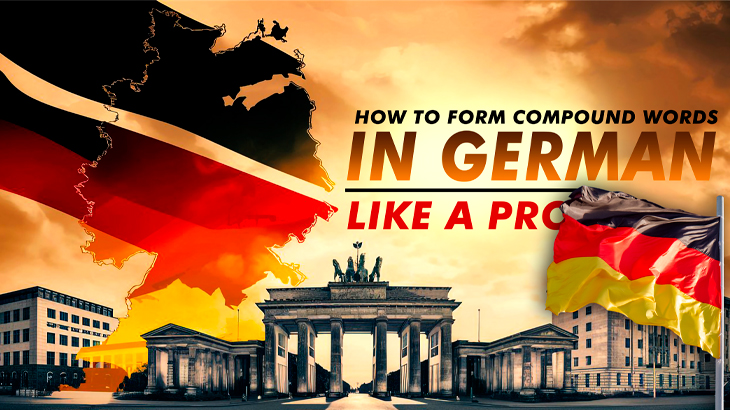
How to Form Compound Words in German Like a Pro
Ever tried reading a German word and thought your screen was glitching?
Something like Donaudampfschifffahrtsgesellschaftskapitänsmütze?
Nope, it’s not a typo. It’s just German doing its thing.
Welcome to the wonderfully weird world of German compound words, where sentences go to become… one word.
In this blog, we’re diving deep into the curious art of compound word formation in German — and showing you how to master it like a wordsmith ninja with a dictionary for a katana.
First Things First: What Is a Compound Word?
A compound word (in any language) is formed when two or more words are combined to create a new word with a unique meaning.
In English, think toothbrush (tooth + brush) or notebook (note + book).
In German, think… longer. Much longer.
The Anatomy of a German Compound Word
German doesn’t just compound two words. Oh no. It goes full-on LEGO mode. It stacks words like pancakes on a Sunday morning, and the result is often one word that means a whole phrase in English.
Let’s break it down:
The Determining Word (Bestimmer): Comes first and gives the specific context
The Core Word (Grundwort): Comes last and defines the main category or object
Example:
Handschuh = Hand (hand) + Schuh (shoe) = Glove
So, a glove is a shoe for your hand. Cute, right?
Common Rules of the Game
Noun + Noun
Kühlschrank = Kühl (cool) + Schrank (cupboard) = Refrigerator
Adjective + Noun
Hochschule = Hoch (high) + Schule (school) = University
Verb (stem) + Noun
Waschmaschine = Wasch (to wash) + Maschine (machine) = Washing machine
Connector Letters (Fugenlaute)
Sometimes Germans sneak in a letter like -s-, -n-, -es- between the words. Like:
Liebesbrief = Liebe (love) + Brief (letter) = Love letter
These letters don’t have fixed rules. Think of them like the salt in your cooking — not always necessary, but often makes things flow better.
How to Form Compound Words Like a Pro
1. Start Small, Think Big
Pick two nouns and try combining them logically.
Buch (book) + Regal (shelf) = Bücherregal (bookshelf)
Wasser (water) + Flasche (bottle) = Wasserflasche (water bottle)
2. Watch for Gender Shifts
The final word determines the gender of the compound.
Sonnenbrille → die Brille = feminine → So, die Sonnenbrille
3. Avoid Overkill… Unless You Want To
Yes, Germans can legally form 60-letter words. But in real life, anything over 3 words is usually split with a hyphen or restructured for sanity.
Fun Exercise: Make Your Own German Compound Word!
Try combining these:
Katze (cat)
Haus (house)
Tür (door)
Klingel (bell)
You might get:
Katzentürklingel — a doorbell just for your cat! (We wouldn’t be surprised if this exists in Berlin.)
Bonus Level: Compound Verbs & Adjectives
While nouns steal the spotlight, German also lets you fuse:
Verbs: kennenlernen (to get to know)
Adjectives: hellblau (light blue), hochintelligent (highly intelligent)
Add a dash of context, and you’re not just speaking — you’re conjuring words.
Why This Matters (and Why It’s FUN)
German compound words are:
● Efficient (they pack in a lot of meaning)
● Descriptive (sometimes hilariously so)
● A window into how Germans think (very logical, occasionally poetic)
Example:
Schadenfreude = damage + joy = the joy you feel at someone else’s misfortune. Oof. But relatable.
Want to actually think in German and not translate in your head? Start building your own compound words daily. Treat it like a game. Challenge yourself to name the weirdest object in your house with a made-up German compound.
Example:
Fernsehsofaschlafdecke = blanket for sleeping on the couch while watching TV. You’re welcome.
Final Words (Literally)
Learning German compound words is like unlocking a secret power. Suddenly, the world looks like a puzzle you can describe in one epic word.
And when you’re ready to take your German word wizardry to the next level — we’ve got courses, community, and coaches at The Language SKOOL who love nerding out over this stuff just as much as you do.
Book your first class. You’ll never look at a “glove” the same way again.











